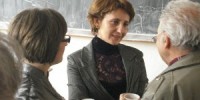In his introductory lecture dr. Josipovič from the Institute for Ethnic Studies in Ljubljana showed that the most common stereotypes concerning immigrants (“migrants have a very high birth rate”, “all migrations have economic reasons”; “migrants are uneducated”, “ they present a threat for the majority population because they are so numerous”) are based on a misinterpretation and manipulation of statistical data. In second lecture Martina Bofulin, a young researcher, talked about the Chinese migrations to Slovenia and their life among us. Continue Reading →
3rd panel in Croatia – Zagreb and Vukovar
The third conference within the project was held in two parts.
Zagreb
The first part, held on April 6, at the Public Open University Zagreb, in Zagreb, when representatives of the Czech minority presented themselves.
The guest lecturer Jarmila Kozak Marinković, Jaromil Kubiček and Juraj Bahnik spoke about Czech people living in Croatia, as well as the society ‘Češka beseda’ from Zagreb, while Maja Burger presented Czechs living in Zagreb.
After the lectures, the folklore group of ‘Češka beseda Zagreb’, namely ‘Záhřébské sluničko’ (Zagrebačko sunčeko – ‘Zagreb little sun’), managed by Martina Marinković, presented themselves with the performance of Czech folk dances. Continue Reading →

3rd Panel in Timisoara, Romania
The third panel took place at ”Miu Technical College”‘ in 16.04.2011, 11:00. We discussed many problems related to migration and how seniors can make a difference in this social phenomenon. 50 seniors participated together with university professors (University of Craiova, West University of Timisoara and Politehnica University), responsibles from the seniors NGOs (The Council of seniors, CARP). More details here.
COMING: 3rd DANET PANEL in SLOVENIA: Migration as a challenge, minorities as a chance
May 6, 2011
History teaches that people – individuals, tribes, nations – have always migrated, often driven by wars, often looking for a better life, in order to meet with their families, but also out of curiosity and joy, wishing to see foreign parts or to enjoy more freedom. But only with the establishment of national states in the first half of the 19th century have common language, history and culture – the common origin and long-lasting territorial co-habitation – become an important factor in the treatment of the population. The state started to count, record and classify those who belong “to us” and those who do not. When we proudly talk about the wealth and diversity of our cultural heritage and our many local and regional identities, we tend to forget that these have been created partly also through acceptance and integration of the influences of “the others”, those who came to live with us and those who left their home-country to live elsewhere and then perhaps returned home – changed by their lives in foreign lands.
Where do we come from? Where do our fathers and grandfathers come from? What residues have they left in us?
Do we have contacts with non-Slovenes? What kind of contacts?
What have we learnt and accepted from them?
What bothers us? What it difficult for us to accept? Do we feel threatened? Are we (in)tolerant? Why?
What are the obstacles in building good relations with other ethnic groups within our society and what activities foster our cooperation and integration (language, values, religion, customs)?
These are the issues we will reflect on and discuss at the 3rd DANET panel in Ljubljana.
Automatic translation
Read this page in your language:
Please note: Google Translate may fail or produce strange results.











